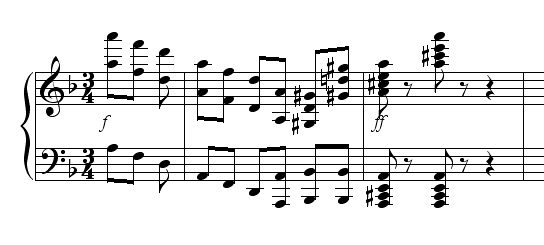Sleepy return to Seattle. The self in the airplane not quite resigned to being in the airplane; it (me?) wants to fly out the window onto distant lights, land in pillowy valleys, roll in wet grass. But the seats around the plane glow (reading lamps); otherwise the tube is dark, the windows are dark; people are bent over People; the beverage cart crawls down the aisle. Each is studiously to his or her own and each seat is a person and each of these seats is bolted in a metal tube and hurled through the air and we cannot leave until the nice people in the uniforms tell us. Study, passengers, pore under your dim lamps. I squirm.
Is it not possible to design a more attractive beverage cart?
Well, I seem to have played the “Hammerklavier” Sonata. A husky-voiced Leon Fleisher passed me (him exiting, me entering) on the backstage path; he said “you should thank me, I had them take up the carpet.” And I do, Leon, I do. Let me add it to the pile of things to thank you for, among which perhaps may I say? … an all-night bus ride with my high school orchestra (me 14 yrs. old?) and waking up at dawn in the deserts of California and playing Fleisher’s Beethoven 3rd on my walkman and between the world outside and puberty and sleep deprivation and the C minor world in my ears being caught in the teeth of something I did not know yet how to name. My fellow scratchy hapless string players slept and I stared out partly into the sad rising sun, partly into my own bus-window reflection … ha, isn’t that a nice metaphor for everything?
Of all the tremendous moments in the “Hammerklavier” surely the most tremendous is after Beethoven sweeps everything off the table; he sweeps his own creation off the table, saying ENOUGH.
I tire, even, of myself. Don’t we all? And then there is this:
His other, better self? Or something selfless? It is worth playing the whole thing (something for a pianist like Shackleton’s Endurance voyage) just to play this moment, I must tell you. The waves of intensity from the previous fugue are crashing against you and you are just still there, trying to hold the line, the new legato line that Beethoven is giving you, trying to hold it against the chaos of the past.
There are many moments, too, in Ives’ “Concord,” where the vast dissonances suddenly give way to the purest tonalities. In “Hawthorne,” Ives sets up a huge wash, total noise, chaos, the opposite of everything pianistic and lovely, and then makes you remove the pedal and there is an F# major chord. It is piercingly beautiful, but beauty made shocking, in an instant, total transformation, a drop over the cliff-face. I think this moment is the one where even the skeptics in the audience say to themselves “maybe Ives isn’t such an idiot after all,” and the wiser Ivesians in the audience think, “that’s only the beginning of what he can do.”
Tremendous chaos, heavy-lifting of mind, and after thinking and working and everything, a simpler solution occurs to you. (Again and again in the Ives this happens.) This new solution is more skeletal, it is barer, like trees stripped of leaves, a crossing of lines not vines, even: pure geometry. For all that, it is not heartless. In fact, it is (for the moment) the most beautiful thing you have ever seen (heard). So that: when Beethoven “gets back to business,” re-attempts the main fugue, in further permutations, some part of you may feel this is anticlimactic. Beethoven keeps looking for more complicated solutions. But you may still be haunted by D major, gazing back at its simplicity; I know I am. And yet you go on.
Ives, by contrast, does not try to “stage a comeback;” everything in the “Concord” gives way to Thoreau’s resignation, to non-action. (Though Thoreau fights this in some ways.) For Ives and Beethoven, after everything, at 3 AM when the bar closes, or at 7 AM when the all-nighter study session is becoming truly surreal, it seems advisable to let go… to try another way …
What is this letting-go? Does it betray the purpose of all the preceding … or is it just another, deeper current, another riverbed? Both pieces wonder about this. They undo what they have done. They know the elation of action, and the still trance of non-action; they depict the enormous plunge from one to the other, the wall of experience where they meet.
Speaking of which, maybe I need a nap.



3 Comments
Thank you, Jeremy. You come closer to saying what cannot be said than anyone I know.
Tuning in to my local NPR affiliate I realized I had just missed a performance of Discoveries at Disney featuring Joshua Bell accompanied by Jeremy. Undaunted, a quick web search led me to an archive of the performance, which I’ve posted here. Hey, Jeremy’s name is a link on the page that opened;I wonder what that’s all about?….Oh my God, I’ve found the mother lode of all things Denk!
http://www.npr.org/templates/story/story.php?storyId=6724643
brent … i must thank you for the link 🙂